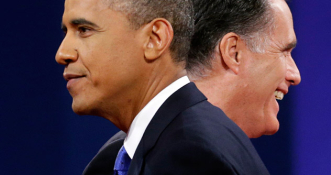Russian-American voters no longer predictable

Although there is little polling data on the preferences of Russian-Americans in 2012, a number of observers of the community said that a significant percentage of the younger generation may choose President Obama. Source: AP
The political profile of the Russian-American community, long considered a bulwark of support for the Republican Party, is beginning to change as a young generation with no experience of the Soviet Union comes of voting age. At the same time, some Russian-American seniors, concerned about social programs like medicare and social security, are also reviewing their longtime support for Republican candidates.
Nina Zaretskaya is a 33-year-old professional who works for a financial firm in New York.
“In my opinion, the younger generation of Russian Americans vote more liberally, and the older generation tends to be more conservative,” she said.
Zaretskaya believes that Russian Americans are not politically active however, because they are still deeply suspicious of “anything communal, and political activity and electoral campaigns are based on communal social activity.”
On the eve of the American presidential election, the community’s historic attachment to the Republican Party is no longer a given. Russian-American conservatism is rooted in the Cold War, when Republicans were viewed as much tougher on the Soviet Union than Democrats.
“After the collapse of communism this situation slowly changed and the Russian diaspora now votes more or less in the same manner as the rest of American public,” said Edward Lozansky, president and founder of the American University in Moscow. “The most successful and well-to-do vote for Republicans while those with lesser income and older ones vote for Democrats, as they are viewed as more likely to fund social programs.
Lozansky, who emigrated to the United States in 1976, describes himself as a conservative Republican. However in an interview with RBTH, he said that he is unable to vote for the Republican candidate Mitt Romney after he labeled Russia the United States “No. 1 geopolitical enemy.”
Romney has in recent weeks softened some of his rhetoric on foreign policy and The New York Times reported last week that Romney’s son, who was recently in Moscow on business, sent a message to the Kremlin through an intermediary that President Mitt Romney would want “good relations” with Russia.
Even if Obama wins, Lozansky said he is quite pessimistic about U.S.-Russia relations.
“Unfortunately, I do not expect big positive breakthroughs with either Romney or Obama, but with Romney there is a serious danger of escalating into at least a rhetorical, Cold War-style confrontation while with Obama the relations will probably be more civilized.”
Although there is little polling data on the preferences of Russian-Americans in 2012, a number of observers of the community said the younger generation is also beginning to break the Republican Party’s lock on Russian-American votes, and a significant percentage of them will choose President Obama.
The younger generation thinks differently,” said Ilya Galak, 49, the editor of Citizens Magazine on Staten Island, New York. “They studied in American schools and colleges.”
Their parents, he said, “are convinced conservatives who, on the one hand, remember life in Soviet Union and, on the other hand, have achieved a lot here so they can compare these two lifestyles and they have chosen conservatism."
Elena Solovyova of Washington, D.C., is a typical first-generation voter.
“We saw firsthand that socialism and collectivism simply do not work and that communist ideals, as inspiring as they may appear at first, lead to ruin, poverty, government control, and oppression,” she said. “The term "conservative" is not what comes to mind when I choose to vote Republican in this or prior elections, it is "individualism," "free spirit" and "free enterprise" that the conservative agenda supports.”
But Bella Proskurova, a 42-year-old clinical psychologist from New York, said she supports Obama.
“To me it’s clear that the Democrats represent the interests of young Americans including Russian Americans,” she said.
Anatoly Ryvkin, 45, the publisher and editor-in-chief for the Brighton Beach News, said new arrivals are less enamored of the Republican Party and some come steeped with President Obama’s glowing image overseas. The community in the U.S. has changed, he said, with Russian-speaking Muslims from the Soviet republics in Central Asia and young professionals adding to its diversity.
“There is no such thing as a united Russian-American constituency,” he said.
Indeed that lack of cohesion was cited by some as a reason for the striking lack of Russian-Americans in political office with the exception of people like David Storobin and Alec Brook-Krasny in the New York state legislature. There are more than 3 million people in the Russian-speaking community, according to the 2008 census, but their political influence appears marginal.
“I think it is due to cultural, religious, ideological differences and other factors separating all 5 waves of Russian emigration,” said Lozansky. “The Russian diaspora is not united and therefore cannot offer a strong unified political voice, except probably for the Russian Jewish community, which is united in its support for Israel.”
But Elena Staroselskaya, a Washington D.C.-area resident and businesswoman who runs the website www.RussianDC.com, said “Russian-Americans have different opinions but are united in promoting and strengthening U.S.-Russia relations.”
All rights reserved by Rossiyskaya Gazeta.
Subscribe
to our newsletter!
Get the week's best stories straight to your inbox
